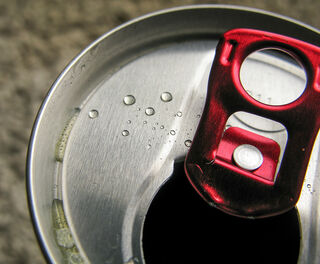Genetics
Driving Fast and Loving Energy Drinks May Be in Our Genes
Fast drivers' impulsivity and energy drink usage may have similar genetic ties.
Posted October 2, 2021 Reviewed by Abigail Fagan
Key points
- Fast drivers tend to score higher on psychometric tests that measure impulsivity and risky thrill-seeking behaviors.
- Drivers who get speeding tickets are more likely to consume energy drinks than law-abiding drivers.
- Genetics may play a role in the impulsive urge to seek excitement, consume energy drinks, and drive fast.

New research into the link between risk-taking behaviors in traffic, drivers who were ticketed for exceeding the speed limit, and energy drink consumption suggests that people who score higher on tests for impulse control disorders and aggressiveness are also more prone to driving fast and consuming energy drinks.
This research also found a correlation between risky driving habits, harmful "unhealthy lifestyle" behaviors (e.g., junk food, substance use disorder), and variants of a gene (5-HTTLPR), which is serotonin transporter polymorphism. These findings will be presented at the 34th European College of Neuropsychopharmacology (ECNP) annual conference in Lisbon and online from October 2-5, 2021.
Fast Driving and Impulsivity May Have Genetic Underpinnings Linked to Serotonin Transporters
This innovative study was conducted by Tõnis Tokko and colleagues from Jaanus Harro's Lab at the University of Tartu. Their multifaceted findings are based on comprehensive longitudinal data from the Estonian Psychobiological Study of Traffic Behaviour combined with police databases, insurance records, psychometric questionnaires, and genetic testing.
"We were able to pick out lots of associations between everyday risk-taking and risky driving. For example, we found that subjects who drink energy drinks at least once a week were twice as likely to speed as those who didn't drink energy drinks as often," Tokko said in a news release.

"We think the energy drink consumption may be related to a need for excitement, rather than the drinks themselves being a direct cause of traffic violations," he added. "Drivers' underlying psychological makeup may lead them both to speed and to want to consume more energy drinks."
The cohort for this study included 817 drivers with about a 50/50 split between men and women (49.2% male, 50.8% female). Among this group, 137 were considered "fast drivers" because they'd gotten police citations for exceeding the speed limit.
Compared to subjects with no speeding tickets in a five-year period, speed limit exceeders tended to have faster reaction times, were more likely to pursue vigorous physical activity, and drank energy drinks more frequently. On average, fast drivers also had higher scores on tests that measured impulsivity and aggression.
A battery of psychological tests showed that study participants with fast decision-making skills were 11% more likely to drive fast; those with higher excitement-seeking scores were 13% more likely to exceed speed limits.
Study participants also underwent a series of blood tests that were used for genetic analysis. The researchers found that certain variants of a gene that controls serotonin transport (the 5-HTTLPR polymorphism) were associated with risky driving and risk-taking behavior in other areas of life.
However, the authors note that these are only preliminary findings. More research is needed to confirm the possible link between 5-HTTLPR and impulsivity both on and off the road.
The Link Between 5-HTTLPR Genes and Impulsivity Is Correlational, Not Causal
"In conclusion, significant associations exist between risky traffic behavior and aspects of lifestyle such as consumption of alcohol or junk food or energy drinks, as well as engagement in vigorous physical activity, while traits such as aggressiveness and the variation in the serotonergic system appear as mediating and moderating factors," the authors write.
"This study shows that people who are reckless in traffic also tend to take chances in other areas of life, and our research shows that there may be a biological tendency to this behavior," Tokko noted.
In an independent comment about this study, Oliver Howes, Professor of Molecular Psychiatry at King's College London, who was not involved in this research, observed: "This study adds to other work showing that psychological and biological traits are linked to how people behave in the world. It's important to recognize that the associations don't mean that one leads to the other."
References
Tõnis Tokko, Diva Eensoo, Kadi Luht-Kallas, and Jaanus Harro. "Unhealthy Lifestyle Is Associated With Risk-Taking in Traffic and Moderated by the Serotonin Transporter Gene Promoter Polymorphism." Presented at the 34th ECNP Annual conference (October 2-5, 2021)
Róger Marcelo Martínez, Chin-Yau Chen, Tsai-Tsen Liao, Yawei Cheng, Yang-Teng Fan, Shih-Han Chou, and Chenyi Chen. "The Multifaceted Effects of Serotonin Transporter Polymorphism (5-HTTLPR) on Anxiety, Implicit Moral Attitudes, and Harmful Behaviors." Frontiers in Psychology (First published: July 10, 2020) DOI: 10.3389/fpsyg.2020.01521


